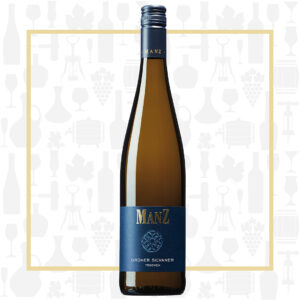Cellar Profile
Weingut Manz is located in the village of Weinolsheim in the northeastern area of Rheinhessen. The Manz family have been winegrowers here since 1725 and today the estate is managed by the 8th generation Manz, Eric. Their vineyard holdings are comprised of 20 hectares dispersed throughout the areas of Oppenheim, Nierstein Weinolsheim, Dienheim and Guntersblum. As is the case with most German producers, their focus is on white wines; Riesling, Pinot Blanc, Pinot Gris, Chardonnay, Silvaner and Gewürztraminer. They also possess small plantings of Pinot Noir and Dornfelder. Like most wineries operating in marginal climates, their annual production varies significantly. On average, they bottle 12,000 cases a year.
Region
Germany’s largest wine region, Rheinhessen was historically known for mainly producing large amounts of bulk wine destined for the export market. That began to change gradually beginning in the 1980s, when growers began to focus on lower yields, drier styles and overall higher quality wines. Today, the region is home to the majority of Germany’s organic/biodynamic viticulture, with a great number of young and energetic producers eschewing the past and leading the future. Unlike other German wine regions, there are significant plantings of many grapes, though Riesling plays a role here as well, to be sure. You will find plenty of Muller-Thurgau, Dornfelder, Silvaner and Pinots Gris, Noir and Blanc throughout. The climate is relatively mild, protected by countless hills and forests and moderated on the east and west border by the Nahe and Rhine rivers, respectively. Soil types vary, though the majority are a mix of loess and loam with limestone deposits mixed with gravel.
Vineyard
Old vine plantings in clay and limestone marl soil. A southwestern exposure ensures full ripeness for development of flavour and complexity. The winery sources from the area and vineyards around the town of Oppenheim, most on steep slopes with excellent drainage.
Varieties
Silvaner at one time was one of the most planted varieties in Germany and the key component in the forgettable Liebfraumilch being produced at the time. Slowly but surely those vines were replaced by a sea of Muller-Thurgau that had less marked acidity for mass consumption wine. The Rheinhessen and Franconia, along with Austria, have carried on with production of fine, drier versions of Silvaner however, and are crafting brilliant expressions of it. Originally from Austria, it migrated to several other areas, including being added to one of the Noble varieties allowed in Alsace Grand Cru (though only in the vineyard of Zotzenberg). Silvaner is best when fully phenolically ripe, where it gives full, flavourful wines with strong acidity and freshness.
Winemaking
Hand-harvested fruit from steep limestone slopes. The press wine is fermented in temperature-controlled stainless steel and given some extended lees aging time in tank afterwards. The wine is bottled lightly filtered.
Tasting Notes
Riper on the nose than many other Silvaners, with expressive pear and apple aromas, along with some floral undertones and a lick of minerality. On the palate, it has the typistic acidity of the varietal, but the lees aging and ripeness of fruit give it a plusher mouthfeel. You can chill this well and crack it out at a picnic, or give it a lighter chill and serve it with Mussels in white wine or seared scallops.

 info@buyersandcellars.ca
www.buyersandcellars.ca
info@buyersandcellars.ca
www.buyersandcellars.ca